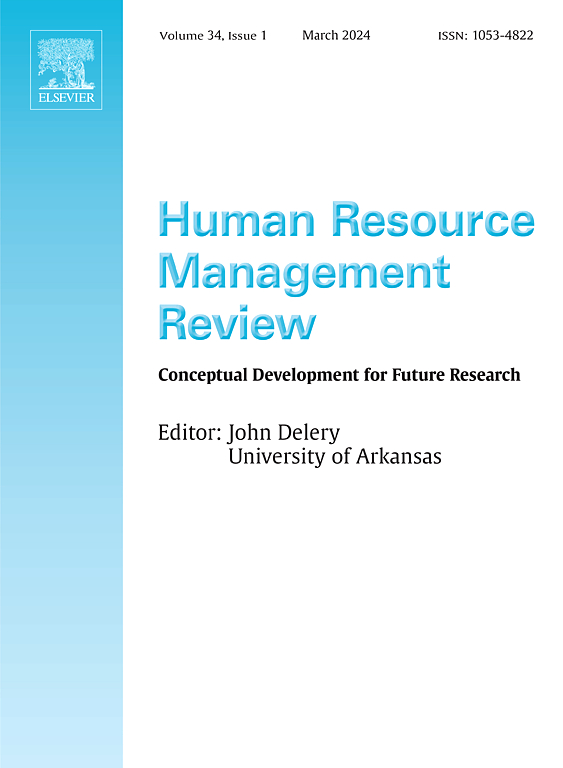Predicting wage theft in organizations
IF 13
1区 管理学
Q1 MANAGEMENT
引用次数: 0
Abstract
Employees naturally expect to be paid for their work; moreover, they expect to be paid fully and on time. Unfortunately, this does not always happen; this phenomenon is known as “wage theft”. Despite wage theft being of paramount importance to employees who experience it, this topic has received scant attention in the human resources management (HRM) research literature. This paper therefore describes the prevalence of wage theft, or the illegal underpayment of employees, and offers several propositions regarding its antecedents, with specific attention to roles of both organizations and managers. This paper also identifies specific strategies that HR managers can use to detect and curtail wage theft and it ends with policy recommendations and suggestions for future research.
预测组织中的工资盗窃
员工自然希望得到工作报酬;此外,他们希望得到全额和及时的报酬。不幸的是,这种情况并不总是发生;这种现象被称为“工资盗窃”。尽管工资盗窃对经历过它的员工来说是至关重要的,但这个话题在人力资源管理(HRM)研究文献中很少受到关注。因此,本文描述了普遍存在的工资盗窃,或员工的非法少付,并提供了几个命题关于其前因后果,特别关注组织和管理者的角色。本文还确定了人力资源经理可以用来检测和减少工资盗窃的具体策略,并以政策建议和对未来研究的建议结束。
本文章由计算机程序翻译,如有差异,请以英文原文为准。
求助全文
约1分钟内获得全文
求助全文
来源期刊

Human Resource Management Review
MANAGEMENT-
CiteScore
20.20
自引率
7.00%
发文量
0
审稿时长
48 days
期刊介绍:
The Human Resource Management Review (HRMR) is a quarterly academic journal dedicated to publishing scholarly conceptual and theoretical articles in the field of human resource management and related disciplines such as industrial/organizational psychology, human capital, labor relations, and organizational behavior. HRMR encourages manuscripts that address micro-, macro-, or multi-level phenomena concerning the function and processes of human resource management. The journal publishes articles that offer fresh insights to inspire future theory development and empirical research. Critical evaluations of existing concepts, theories, models, and frameworks are also encouraged, as well as quantitative meta-analytical reviews that contribute to conceptual and theoretical understanding.
Subject areas appropriate for HRMR include (but are not limited to) Strategic Human Resource Management, International Human Resource Management, the nature and role of the human resource function in organizations, any specific Human Resource function or activity (e.g., Job Analysis, Job Design, Workforce Planning, Recruitment, Selection and Placement, Performance and Talent Management, Reward Systems, Training, Development, Careers, Safety and Health, Diversity, Fairness, Discrimination, Employment Law, Employee Relations, Labor Relations, Workforce Metrics, HR Analytics, HRM and Technology, Social issues and HRM, Separation and Retention), topics that influence or are influenced by human resource management activities (e.g., Climate, Culture, Change, Leadership and Power, Groups and Teams, Employee Attitudes and Behavior, Individual, team, and/or Organizational Performance), and HRM Research Methods.
 求助内容:
求助内容: 应助结果提醒方式:
应助结果提醒方式:


